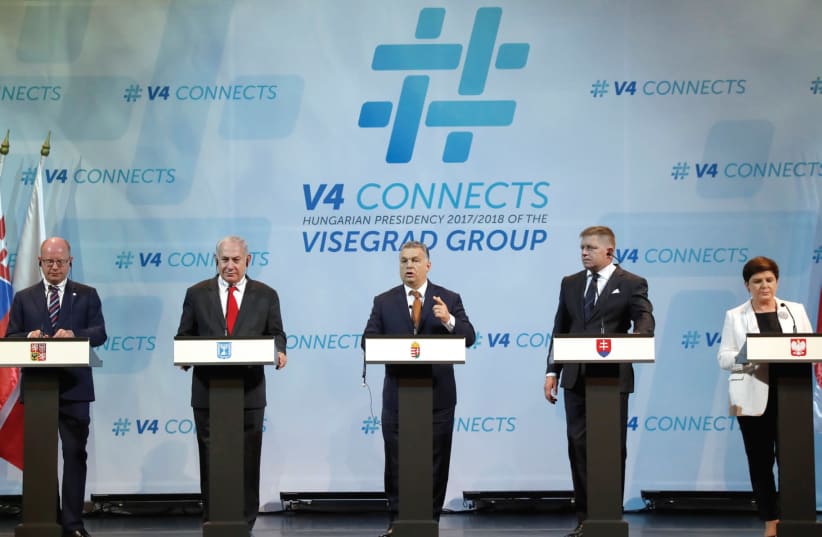Prime Minister Netanyahu has proved over his nine-year-term to be a champion in forging new relations and keeping longstanding relations alive, even though some of these relations are being challenged. The behind-the-scenes ties are also not a negligible part of his achievements, if we consider that Israel and Saudi Arabia have been cooperating at some level that could represent the first step to a broader peace transcending the territories between the sea and the Jordan valley.
When it comes to the European Union, Netanyahu has maintained the Association Agreement signed back in 1995 and continues to hold good diplomatic relations with all EU states. It should be as simple as that if he wasn’t criticized for holding relations with some of the EU states that many consider to be illiberal and borderline antisemitic. However, in practice, these very same states have been supportive of Israel when discussions occurred about the prospect of boycotting Israeli goods or when Israel was being held responsible for some of the violence involving Hamas, a terrorist organization recognized as such by the European Union.
Paradoxically, the EU states that are considered to be perfect democracies have been involved in debates on Israel’s supposed human rights abuses in the Palestinian territories and on many occasions resorted to disproportionate condemnations against Israel, the only democracy in the Middle East.
IRELAND, AS MEP Guy Verhofstadt, aka the advocate for a Federal Europe, would claim, “The ideal democracy where both the government and the opposition are liberal” recently passed a law allowing the state to boycott Israeli goods originating from the West Bank.
In addition, High Representative of European External Action Service Frederica Mogherini has failed to sustain EU policy regarding the Israeli-Palestinian conflict and simply omitted Hamas’s role from all of her recent statements.
These are the figures who represent the moderate states of the European Union. And these are the states that everyone expects Netanyahu to capitulate to and give in to all of their demands.
Courageously, Netanyahu chose to defy their stances and strengthen ties with states, including EU states that do understand Israel’s policies and most importantly, Israel’s delicate security requirements. The V4 countries (Hungary, Poland, Czech Republic and Slovakia) + Romania and Latvia have been supportive of Israel and even consider to follow the American footsteps by debating on a possible move of their embassies to Jerusalem.
On a more negative note, Poland and Hungary did put some question marks on their real intentions with the Jewish world. Hungarian PM Orban’s harsh campaign against billionaire civil organizations funder George Soros raised many questions about whether the Hungarian government is guilty of old-school antisemitism. This accusation was significantly weakened when Hungary cooperated with the World Jewish Congress on a joint statement on antisemitism delivered at the UNHRC.
POLAND’S HOLOCAUST law equally made the Jewish world cringe. Israeli MKs rejected the bill and branded it as an attempt to falsify historical facts. Netanyahu and Polish PM Morawiecki ended up signing a joint declaration with the aim to create a narrative that should do justice to historical facts. Instead, Netanyahu was accused of giving in and this time sacrificing history for the sake of short-term gains. Yet we have seen over the course of the last couple of weeks that these very historical facts contain some gray areas which even led to Yad Vashem’s historians to clash and fail to speak in one voice. Dutch Jewish journalist Hans Knoop, aka the hunter of war-criminal Pieter Menten, acknowledged the inconvenient parts where the Polish narrative might gain ground. Without downplaying the fact that a significant part of the Polish population was profoundly antisemitic and that too many Poles jumped on the occasion to murder Jews, he claims, “Despite the deeply rooted antisemitism in Poland, there was no legal discrimination of Jews before Second World War; Jews could own companies, factories and participate fully in economic life. They also participated in politics and were even represented with the Jewish Socialist Democratic Party Bund at the Polish Parliament.” He further claimed, “On December 10, 1942, the Polish government presented the detailed 21 points report to the British Foreign Secretary R.A. Eden. Except for a statement in the British Parliament condemning the slaughter, nothing happened. The brilliant historian Martin Gilbert described in detail how the envoy of the Polish underground Jan Karski, together with foreign minister Count Edward Raczynski, kept on pressing the allies for action to save the Jews.”
Hans Knoop ends his view by stating that they probably did not do enough.
But who really did? Putting things into perspective, most of the criticism coming from Germany and other Western EU states is mostly due to the V4 countries’ defiance against the refugees and for questioning the EU quota and thus undermining EU’s cohesion when it comes to the refugees or the EU as Federal Government as a whole. In other words, their objections have nothing to do with Orban’s campaign against Soros or Morawiecki’s Holocaust law and has everything to do with differences in policies that jeopardize the future of the EU. Netanyahu, on his part, should not interfere with internal European politics, neither should he apologize for any of his relations, and certainly not for keeping friendly ties with states rooting for Israel.
The writer is a director at Golden Gate Public Affairs & Consultancy and works at the European Parliament in Brussels.
